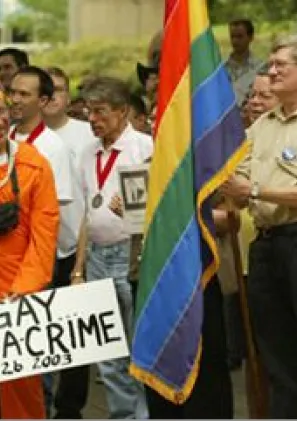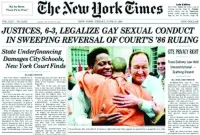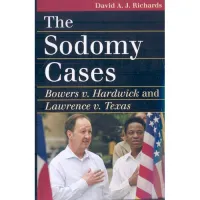-
Bowers v. Hardwick & Lawrence v. Texas SCOTUS Rulings That Changed Everything
"To hold that the act of homosexual sodomy is somehow protected as a fundamental right would be to cast aside millennia of moral teaching."
- Chief Justice Warren Burger's concurring opinion in Bowers v. Hardwick
"The petitioners [Lawrence and Garner] are entitled to respect for their private lives. The State cannot demean their existence or control their destiny by making their private sexual conduct a crime. The case involves liberty of the person both in its spatial and more transcendent dimensions ... Bowers was not correct when it was decided, and it is not correct today."
- Justice Anthony Kennedy majority opinion in Lawrence v. Texas
On June 30, 1986 U.S. Supreme Court Chief Justice Warren E. Burger argued that "to hold that the act of homosexual sodomy is somehow protected as a fundamental right would be to cast aside millennia of moral teaching." The case is question, Bowers v. Hardwick, had been thought an ideal precedent through which the American Civil Liberties Union (ACLU) could challenge the nation’s sodomy laws. Instead, the Court’s decision – which was fixated on homosexual acts even though the Georgia statute in question applied to heterosexuals as well – reduced gay men to the proscribed sexual activity in which they might partake – then, by opposing the right to engage in such acts – effectively negated a gay person’s right to exist as a legally defensible construct. The impact of this ruling – rendered at the dawn of the AIDS crisis – turned every gay man into a de facto criminal for whom death from a sexually transmittable disease was easily seen as a fitting punishment by much of society. It was in this chilling cultural and legal environment that the most strident days AIDS activism played out. For the next seventeen (17) years the battle for the right to sexual expression would rage amidst an epidemic that transformed nearly every accepted social, medical and legal construct. Everything began to change in 1998 when John Lawrence and Tyrone Garner were arrested in Lawrence’s home and arrested for engaging in “deviate sexual intercourse with another individual of the same sex." Lambda Legal Defense represented the two men through a series of trials and appeals which culminated at the U.S. Supreme Court. In Lawrence v. Texas Lambda argued that the state’s sodomy statute, which applied to homosexuals only, violated the plaintiff’s rights to equal protection under the law, and that its enforcement was contrary to the Due Process Clause of the Fourteenth Amendment. On June 26, 2003, the Supreme Court released its 6–3 decision striking down the Texas statute, reversing the precedent itself had set in Bowers v. Hardwick. In his opinion for the majority, Justice Anthony Kennedy wrote that Lawrence and Garner were “entitled to respect for their private lives” and that the state “cannot demean their existence or control their destiny by making their private sexual conduct a crime." He added that "Bowers was not correct when it was decided, and… should be and now is overruled." With the stroke of a pen all of the remaining sodomy statutes in the United States were rendered unconstitutional. Gay people – who had been reduced to nothing more than a sex act – were given back their humanity, at least in the eyes of the law. But the struggle for equality in the court of public opinion would continue.
Demography
Nations Affiliated United States
Era/Epoch Information Age (1970-present) Post-Stonewall Era (1974-1980)
Resources





